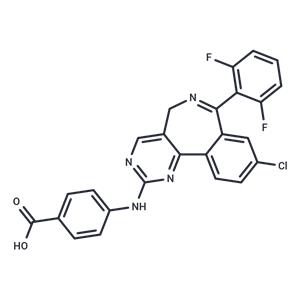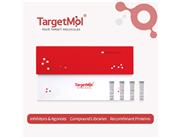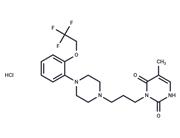| Name | MLN8054 |
| Description | MLN8054 is a potent and selective Aurora A kinase inhibitor with an IC50 of 4 nM. |
| Cell Research | Human tumor cell lines are grown in 96-well cell culture dishes according to the distributor's recommendations. MLN8054, diluted in DMSO, is added to the cells in 2-fold serial dilutions to achieve final concentrations ranging from 10 mM to 0.04 mM. MLN8054 at each dilution is added in triplicate with each replicate on a separate plate. Cells treated with DMSO (n = 6 wells per plate; 0.2% final concentration) serves as the untreated control. The cells are treated with MLN8054 for 96 hours at 37 °C in a humidified cell culture chamber. Cell viability in each cell line is measured by using the Cell Proliferation ELISA, BrdU colorimetric kit according to the manufacturer's recommendation(Only for Reference) |
| Kinase Assay | Enzyme Assays : Recombinant murine Aurora A and Aurora B protein are expressed in Sf9 cells and purified with GST affinity chromatography. The peptide substrate for Aurora A is conjugated with biotin (Biotin-GLRRASLG). Aurora A kinase (5 nM) is assayed in 50 mM Hepes (pH 7.5)/10 mM MgCl2/5 mM DTT/0.05% Tween 20/2 μM peptide substrate/3.3 μCi/ml [γ-33P]ATP at 2 μM by using Image FlashPlates. Aurora B kinase (2 nM) is assayed with 10 μM biotinylated peptide Biotin-TKQTARKSTGGKAPR in 50 mM Tricine (pH 8.0)/2.5 mM MgCl2/5 mM DTT/10% glycerol/2% BSA/40 μCi/ml [γ-33P]ATP at 250 μM. The conditions for all other in vitro kinase assays are available upon request. MLN8054 is run in a 226 kinase screen at a 1 μM compound concentration with an ATP concentration of 10 μM for all assays. |
| In vitro | MLN8054 is an ATP-competitive, reversible inhibitor of recombinant Aurora A kinase with an IC50 of 4 nM, demonstrating over 40-fold selectivity for Aurora A compared to Aurora B. [1] In vitro, MLN8054 inhibits growth across various cell lines from diverse tissues with IC50 values ranging from 0.11 μM to 1.43 μM. It selectively inhibits Aurora A over Aurora B in cultured cells, and impedes cell proliferation by inducing G2/M accumulation and spindle defects in multiple human tumor cell lines. [1] A recent study indicates that MLN8054 sensitizes androgen-resistant prostate cancer to radiation by inhibiting Aurora A kinase, leading to sustained DNA double-strand breaks. [2] |
| In vivo | In HCT-116 tumor-bearing mice, oral administration of MLN8054 at 3 mg/kg, 10 mg/kg, and 30 mg/kg once daily results in dose-dependent tumor growth inhibition (TGI: 76% and 84% for 10 mg/kg and 30 mg/kg, respectively). MLN8054 demonstrates similar antitumor activity in PC-3 tumor xenografts in nude mice. [1] In HCT-116 xenograft-bearing animals, MLN8054 induces DNA and tubulin staining of tumor tissue in nuclear and cell body areas, consistent with a senescent phenotype, by increasing senescence-associated beta-galactosidase activity. [3] |
| Storage | Powder: -20°C for 3 years | In solvent: -80°C for 1 year | Shipping with blue ice. |
| Solubility Information | Ethanol : < 1 mg/mL (insoluble or slightly soluble)
DMSO : 88 mg/mL (184.5 mM)
H2O : < 1 mg/mL (insoluble or slightly soluble)
|
| Keywords | inhibit | MLN-8054 | MLN8054 | Aurora Kinase | MLN 8054 | Inhibitor |
| Inhibitors Related | Nintedanib | Capivasertib | Vemurafenib | Acefylline | Staurosporine | 8-Bromo-cAMP sodium salt | Emodin | Ibrutinib | Dasatinib | Ponatinib | Palmatine | JAK1/2/3 Inhibitor 1 |
| Related Compound Libraries | Highly Selective Inhibitor Library | Bioactive Compound Library | Tyrosine Kinase Inhibitor Library | Kinase Inhibitor Library | Anti-Cancer Clinical Compound Library | Drug Repurposing Compound Library | Inhibitor Library | Bioactive Compounds Library Max | Anti-Cancer Drug Library | Anti-Cancer Active Compound Library |

 United States
United States



